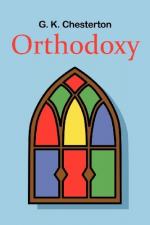
|
| Name: _________________________ | Period: ___________________ |
This test consists of 15 multiple choice questions and 5 short answer questions.
Multiple Choice Questions
1. How has western religion interacted with the idea of social organisms?
(a) Western religion says that no person should be alone.
(b) Western religion says that the family unit is the only important social organism.
(c) Western religion says that the church provides the only stable society.
(d) Western religion says that social organisms are harmful to faith.
2. In general, what does Chesterton say is a liberal clergyman's attitude toward miracles?
(a) They do not exist.
(b) They exist.
(c) Only particular people can perform miracles.
(d) They existed only in Biblical times.
3. In Chesterton's example, why is it important for Gradgrind to give his employees skeptical literature?
(a) He wants to keep their minds sharp.
(b) If their minds always change, they will be content with anything he provides.
(c) He wants to tear down the traditions.
(d) If the ideal always changes, earthly life will stay the same.
4. What was Chesterton's early progression through religious mindsets?
(a) Pantheist by twelve, Christian by fifteen.
(b) Pagan by twelve, agnostic by sixteen.
(c) Pagan by six, pantheist by eight.
(d) Agnostic by ten, Christian by thirteen.
5. Chesterton names four standards by which people try to establish the ideals of equality and inequality. What is the first?
(a) Persuasive thinking, similar to Nietzsche's.
(b) The progression of creatures through evolution.
(c) The passage of time.
(d) God-given authority.
6. Why does Chesterton say there is no equality or inequality in nature?
(a) The standard of value changes within each species.
(b) Humans cannot judge by animal standards.
(c) Oligarchy is a human construction.
(d) There is no standard for value.
7. After studying the attacks on Christianity, what did Chesterton conclude?
(a) Christianity must be very wrong or absolutely right.
(b) Christianity was full of logical problems.
(c) Attacks on Christianity were largely valid.
(d) Christianity might actually be true.
8. At the beginning of Chapter VIII, the Romance of Orthodoxy, what does Chesterton name as the cause for busyness in modern society?
(a) Laziness.
(b) Stress.
(c) Bustle.
(d) Fast-paced life.
9. What oddity does Chesterton find in the modern world?
(a) Men have artistic luxury but physical poorness.
(b) Men ignore the spiritual life in pursuit of the physical.
(c) Men have physical luxury but artistic poorness.
(d) Men ignore the physical life in pursuit of the spiritual.
10. How does Bernard Shaw speak of miracles?
(a) With contempt.
(b) With awe.
(c) With disbelief.
(d) With admiration.
11. In determining his criteria for progress, what does Chesterton discover?
(a) Christianity could not answer any of his questions.
(b) Christianity could lead him to the answers.
(c) Buddhism shed some light on his questions.
(d) Christianity arrived there first.
12. How does Chesterton contrast pantheism and action?
(a) Pantheism looks only at the world; action looks also at the supernatural.
(b) Pantheism says one thing is as good as another; action chooses one thing as best.
(c) Pantheism is completely inactive and therefore opposes action.
(d) Pantheism entails all possibilities; action is exclusive in its choice.
13. What is the thesis of Mrs. Besant's book?
(a) All religions are the same, and their church is the universal self.
(b) God is distant from the world and man must struggle on alone.
(c) Each religion has the same basic tenets but a different God figure.
(d) Man's largest desire is unity with all of humanity.
14. In the Christian's view, why does a man's soul provide enough outlet for both the optimist and the pessimist?
(a) He now has reason to claim brotherhood with Christ.
(b) He is exalted as God's creation and humbled as a sinner.
(c) Both passions are allowed free reign.
(d) He has hope for a heavenly future but fear for an earthly one.
15. Chesterton chooses miracles as his first example regarding liberal thinking. What does he call this example?
(a) The easiest place to start.
(b) The worst problem facing liberals.
(c) The most obvious choice.
(d) The easiest point to prove.
Short Answer Questions
1. Why does Chesterton say that miracles are eminently desirable?
2. How does Chesterton's example of the blue world explain modernity's attitude toward progress?
3. What is Pimlico?
4. What is Chesterton's stated goal for Chapter VIII, The Romance of Orthodoxy?
5. In looking at Christianity and materialism, what coincidence stopped Chesterton in his tracks?
|
This section contains 815 words (approx. 3 pages at 300 words per page) |

|




